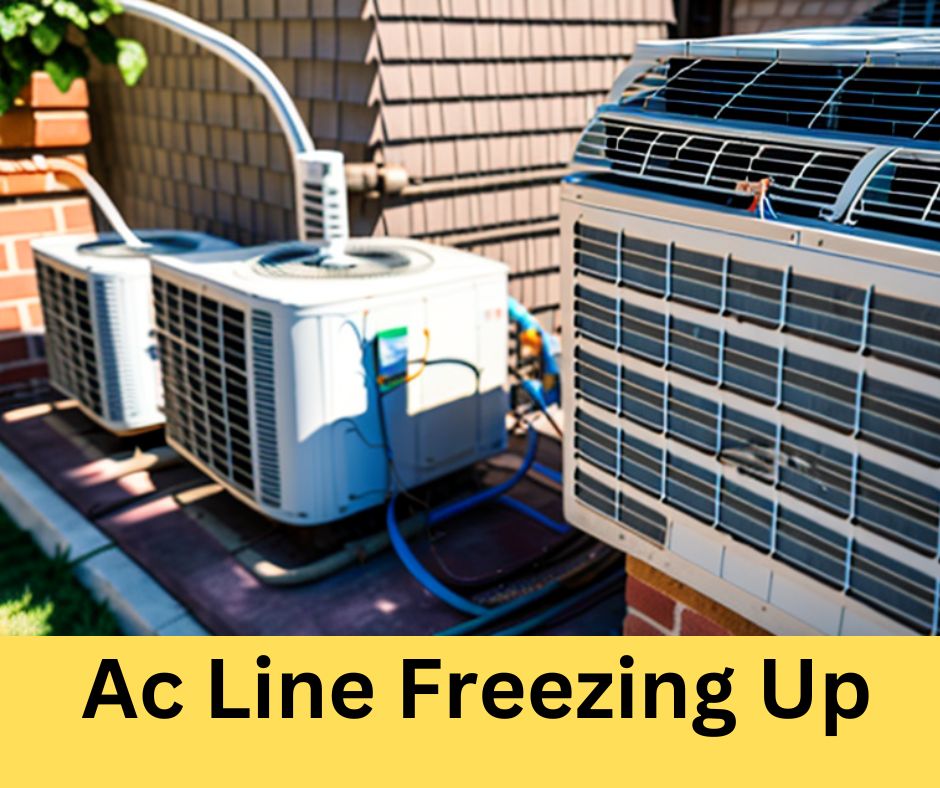Why is my AC line freezing up? If you’ve ever wondered why your air conditioning system’s line is frozen, you’re not alone. Even in the hot and humid Kansas heat, this issue can occur. But fear not! We have all the details you need to understand why this happens and how to troubleshoot it. Stay connected with us for better information on keeping your AC unit in good working condition and preventing those icy surprises. Let’s dive into the common causes and solutions for a frozen AC line.
Why Is My Ac Line Freezing Up

Common Reasons for AC Line Freezing:
- Poor Airflow: Insufficient airflow across the evaporator coil can lead to freezing. When the air isn’t moving properly, the coil gets too cold, causing condensation to freeze on it. Check your air filters and ensure they’re clean. Dirty filters restrict airflow, so regular filter maintenance is crucial.
- Low Refrigerant Levels: Refrigerant (the cooling agent) plays a vital role in the AC system. If there’s a leak or if the refrigerant levels are low, the evaporator coil won’t function correctly, leading to freezing. A professional technician can check and refill refrigerant levels if needed.
- Thermostat Issues: A malfunctioning thermostat can cause the AC to run continuously, even when it’s not necessary. This constant operation can lead to freezing. Make sure your thermostat is set correctly and consider upgrading to a programmable one for better control.
- Blocked Air Vents: Blocked or closed air vents disrupt proper airflow throughout your home. Ensure that all vents are open and unobstructed to maintain consistent airflow.
- Dirty Evaporator Coil: Over time, dust and debris accumulate on the evaporator coil, reducing its efficiency. Regular professional maintenance includes cleaning the coil to prevent freezing.
- Faulty Blower Motor: The blower motor circulates air through the system. If it’s malfunctioning or running at an incorrect speed, it can cause freezing. A technician can diagnose and repair blower motor issues.
What should I do if my line is frozen?
Certainly! If your AC line is frozen, follow these steps to address the issue:
- Turn Off the AC: First, switch off your air conditioning system. Continuing to run a frozen AC can cause further damage.
- Thaw the Line: Allow the frozen line to thaw naturally. Turn off the thermostat and let the system defrost. You can speed up the process by using a hairdryer on low heat or placing warm towels around the frozen section.
- Check Air Filters: Dirty or clogged air filters restrict airflow, leading to freezing. Replace or clean your air filters regularly to maintain proper airflow.
- Inspect Vents and Registers: Ensure that all vents and registers are open and unblocked. Proper airflow prevents freezing.
- Check Refrigerant Levels: Low refrigerant levels can cause freezing. Consult a professional HVAC technician to check for leaks and refill refrigerant if necessary.
- Examine the Evaporator Coil: If the coil is dirty, it won’t function efficiently. Regular maintenance includes cleaning the evaporator coil.
- Inspect Blower Motor: A faulty blower motor affects airflow. Have it checked by a technician and repair or replace if needed.
- Schedule Professional Maintenance: Regular maintenance prevents future freezing issues. Hire a professional to inspect your AC system, clean components, and ensure optimal performance.
How Does An Air Conditioning Unit Work?
-
The Basics:
- An air conditioning (AC) unit is designed to cool indoor spaces by removing heat and humidity.
- It operates on the principles of thermodynamics, using a refrigeration cycle to transfer heat from inside to outside.
-
Components:
- Evaporator Coil: Located inside the indoor unit, the evaporator coil absorbs heat from the room air.
- Compressor: The heart of the system, the compressor pressurizes and circulates the refrigerant.
- Condenser Coil: Located in the outdoor unit, it releases heat absorbed from indoors.
- Expansion Valve: Regulates refrigerant flow and pressure.
- Refrigerant: A chemical compound that changes state (liquid to gas and back) during the cycle.
-
The Refrigeration Cycle:
- When you turn on the AC, the evaporator coil cools down as warm indoor air passes over it.
- The refrigerant absorbs heat from the air, evaporating into a gas.
- The compressor then compresses this gas, raising its temperature and pressure.
- The hot refrigerant flows to the condenser coil outside.
- Here, it releases heat to the outdoor air, condensing back into a liquid.
- The expansion valve reduces pressure, allowing the refrigerant to evaporate again in the evaporator coil.
-
Heat Exchange:
- As the refrigerant cycles between evaporator and condenser, it transfers heat from indoors to outdoors.
- Warm indoor air becomes cooler, creating a comfortable environment.
-
Humidity Control:
- AC units also dehumidify by condensing moisture from the air onto the evaporator coil.
- The condensed water drains away.
-
Air Distribution:
- Blower fans circulate cooled air through ducts and vents into different rooms.
- Return ducts pull warm air back to be cooled again.
-
Thermostat Control:
- The thermostat senses room temperature and signals the AC to turn on or off.
- Modern thermostats allow precise temperature settings and scheduling.
-
Energy Efficiency:
- Proper insulation, regular maintenance, and efficient equipment contribute to energy savings.
How Do I Keep My Air Conditioner From Freezing Up?
Maintain Proper Airflow:
- Clean or Replace Air Filters: Dirty filters restrict airflow, causing the evaporator coil to get too cold. Regularly clean or replace your air filters to ensure optimal airflow.
- Open Vents and Registers: Ensure all vents and registers are open and unblocked. Proper airflow prevents freezing.
-
Check Refrigerant Levels:
- Low refrigerant levels can lead to freezing. Consult a professional HVAC technician to check for leaks and refill refrigerant if needed.
-
Inspect the Evaporator Coil:
- Over time, dust and debris accumulate on the evaporator coil, reducing its efficiency. Regular professional maintenance includes cleaning the coil to prevent freezing.
-
Thermostat Settings:
- Set your thermostat correctly. Avoid extremely low temperatures that cause excessive cooling and freezing.
- Consider upgrading to a programmable thermostat for better control.
-
Avoid Constant Operation:
- A malfunctioning thermostat or faulty blower motor can cause the AC to run continuously, leading to freezing. Have these components checked by a technician?
-
Humidity Control:
- Use a dehumidifier if your indoor humidity levels are high. Excessive humidity can contribute to freezing.
-
Regular Professional Maintenance:
- Schedule annual maintenance with an HVAC specialist.
- They’ll inspect your system, clean components, and ensure everything is functioning properly.
FAQ:
Why does my AC line freeze in hot weather?
Answer: Even in hot weather, an AC line can freeze due to poor airflow, low refrigerant levels, or thermostat issues.
What causes a frozen AC line in Florida’s heat?
Answer: Florida’s humidity exacerbates the problem. Insufficient airflow, dirty coils, and low refrigerant levels contribute to freezing.
Why does my AC run but not cool my home?
Answer: A frozen AC line can cause this issue. Check for blocked vents, dirty filters, and thermostat settings.
How can I prevent my AC line from freezing?
Answer: Regularly clean or replace air filters, ensure proper airflow, and schedule professional maintenance.
What should I do if my AC line is frozen?
Answer: Turn off the AC, thaw the line naturally, check filters and vents, and consult a technician if needed.
Conclusion:
In summary, if you’ve ever wondered why your AC line is freezing up, there are several common reasons to consider. Poor airflow, low refrigerant levels, thermostat issues, and dirty components can all contribute to this problem. Regular maintenance, proper insulation, and professional inspections help prevent icy surprises and keep your air conditioning unit running smoothly. Stay cool and comfortable!



